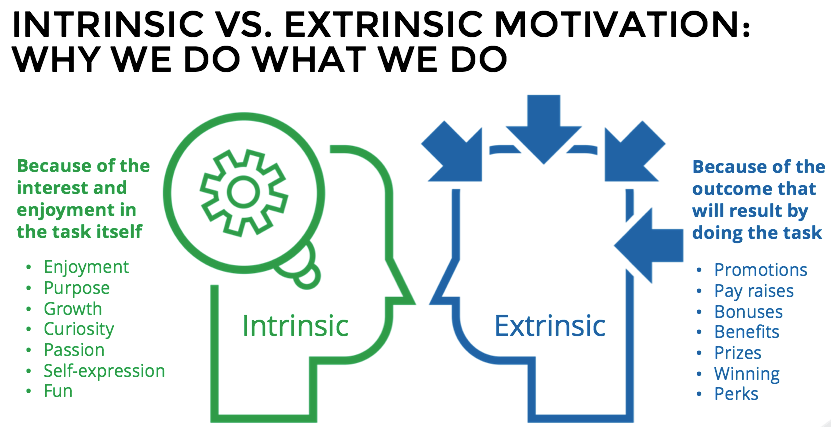The one about motivation
As some of my followers know, motivation in education is one of my favourite subjects. Not only because I'm a in a field of work that is insanely related with motivation, but also because it's the theme of my master thesis and I loved working on that.
In my view, motivation (or lack of it) is one of the main signs of the inadaptabilty of most educational systems to the reality of life. In another post I'll develop why I said signs instead of reasons, but for now we'll stay with motivation.

If you can give candies... Why can't you give motivation?
Although motivation is a common theme among educators, it is actually a much wider concept and it's quite central in psychology. Almost everything we do from the point we wake up is an action led by a motive: when a phsychologist understands motives he gets to understand actions and from there he can help a pacient.
One characteristic of motivation is that it is intrinsic by nature. This means that regardless of what makes a person solve a problem or pursue a goal (for example solve a math problem because he gets a candy), the motivation itself will always come from his own mind. What causes the development of a motive, that can be external or internal, thus creating the concepts of extrinsic and intrinsic motivation.
Side note - While it still explains a lot of behaviours, the idea that a human being does something because of a need is not broad enough. Instead, the concept of goal seems to better explain our actions. For example, since the need to eat can be sometimes postponed by our goal to finish watching a movie, we can instead say that we created a goal of going to the bathroom that it's not yet strong enough to make us take immediate action.
So, the idea that a teacher can give motivation for a student to learn is a myth, repeated by many directors, managers, politicians, critics and, ultimately, parents. While it's true that the teacher has a very important role in helping students learn things, there's no such thing as "giving motivation", since the motivation always comes from within.Without motivation, a child will never learn.
Extrinsic and intrinsic motivation
Although it may seem that most of our actions have an internal cause, the reality shows the opposite. We think of easy sentences like "I'll run because there's a prize for me at the end", but even a sentence like "I'll eat this apple because I'm healthy" is an example of external regulation (the mechanism that drives a person's action), since it is the projection of a healthy self that makes the goal of eating the apple. Another common example is "I play tennis because that's part of who I am": it is the assimilation of the external cause in order to be congruent with the sense of self.
The relationship between the cause of the motivation and our self can then be more or less strong, and we can work on that. A child may learn maths at school because it makes her teacher happy, and after some years she learns because she loves it, or because she sees herself as a good mathematician.
Intrinsic motivation is actually quite simple: people act because they enjoy or find it interesting.

Bach to school
In school it may seem like the only viable motivation for learning is the intrinsic. Students that really love a subject are more prone to study for themselves and quickly learn and apply what they've learned. But many types of extrinsic motivation are effective and they can be applied to several types of students.
In my experience as a cello teacher (lack of motivation to practice cello everyday is a big issue), I find that children can deal well with very basic extrinsic motivation and even an emoji in his cello bag as a prize for good week of practice is effective if in small doses. With adolescents, since they're still finding their own path, I try as much as possible to learn their interests and then convince them of how practicing cello may help them develop those interests. Sometimes they just understand that making music is good for them. But also sometimes they only practice because of pure competition, or because they want to play with their friends.
But the most difficult students in terms of motivation are the adults, and I LOVE teaching adults because of that. Although there may be some external causes for their interest, most of them just learn to play because they enjoy playing. But external events are constantly making them doubt of their abilities, which contamines and disguises as lack of inesgotable, healthy intrinsic motivation.
How can I be more motivated to something?
As I said before, motivation is important in everything, not just in learning. Even for Steemit you need motivation, since a lot of it is extrinsic motivation (and quite basic) and it just doesn't last much. So either you get rewards fast or you just give up. These rewards can also spoil intrinsic motivation, and that's something I'll develop in another post.
Another problem is when you're trying to give up actions that have a strong intrinsic characteristic because of an extrinsic origin. That's why it's hard to quit smoking, for example.
On either cases, the first thing is to identify the origin of the motivation: grab a notebook and try to understand what is really the "fuel" for your actions. Does it come from within you? Or it has an outside origin? Again be aware that external origins are sometimes tricky to find out when they're at higher stages of internalization!
Then you need to understand how can you change the way you're making things so that it internalises deeper in you. To go for the harder case, if you want to stop smoking you should focus on what gets much better when you do, like the taste of food, the change in the breathing, and some other things that are stronger than the pure savings of money or even less strong, the idea that you'll live longer (those are weak motivations).
Of course if you're up to clean a toilet, it's quite difficult to get motivation, specially if it's not your house's toilet (because if it is, you still can grab on to the idea that you're taking care of your family's higiene). There are some actions that cannot be very much improved in terms of internalization and we just need to stick with earnings and getting better paid for them.
Do you have difficulties managing your motivation?
How many of your actions have internal causality?
Do you have a different view from this one?


